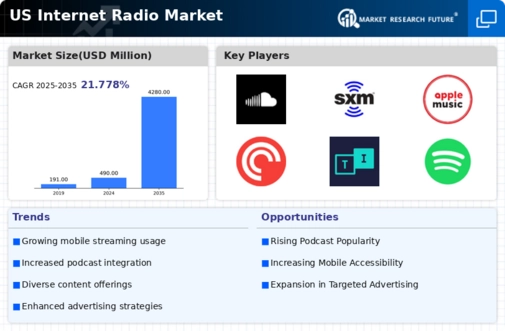Rising Mobile Usage
The proliferation of smartphones and mobile devices has catalyzed the growth of the internet radio market. As of 2025, approximately 85% of adults in the US own a smartphone, facilitating easy access to streaming services. This trend indicates a shift in consumer behavior, where users prefer listening to music and talk shows on-the-go. The convenience of mobile applications allows listeners to engage with their favorite content anytime, anywhere. Consequently, the internet radio market is likely to see an increase in user engagement and subscription rates, as mobile platforms become the primary medium for audio consumption. Furthermore, the integration of mobile data plans with unlimited streaming options may further bolster this growth, making it an essential driver for the market.
Growth of Podcasting
The surge in podcasting popularity is reshaping the landscape of the internet radio market. By 2025, it is projected that over 50% of the US population will have listened to a podcast, indicating a shift in audio consumption preferences. This growth presents an opportunity for internet radio platforms to diversify their content offerings, integrating podcasts into their programming. The internet radio market can leverage this trend by attracting advertisers looking to reach engaged audiences. Additionally, the potential for cross-promotion between traditional radio and podcasting could enhance listener engagement. As more creators enter the podcasting space, the internet radio market may experience increased competition, driving innovation and content quality, ultimately benefiting consumers.
Adoption of Smart Speakers
The increasing adoption of smart speakers in US households is significantly impacting the internet radio market. As of 2025, it is estimated that around 50% of US homes have at least one smart speaker, such as Amazon Echo or Google Home. These devices facilitate hands-free access to internet radio, allowing users to stream their preferred stations effortlessly. The convenience and functionality of smart speakers are likely to enhance user experience, leading to higher listener retention rates. Moreover, the internet radio market may benefit from partnerships with smart speaker manufacturers, enabling seamless integration of services. This trend suggests that as more consumers embrace smart home technology, the demand for internet radio services will continue to rise, potentially increasing advertising revenues and subscription models.
Emergence of Subscription Models
The rise of subscription-based models is reshaping the revenue landscape of the internet radio market. As consumers become more accustomed to ad-free experiences, platforms are increasingly offering premium subscriptions. By 2025, it is projected that subscription revenues will account for nearly 30% of total internet radio market revenue in the US. This trend suggests that listeners are willing to pay for enhanced features, such as exclusive content and offline listening capabilities. The internet radio market may see a shift in business strategies, with more emphasis on creating value-added services to attract subscribers. Additionally, the competition among platforms to offer unique content could lead to innovative offerings, further driving growth in the subscription segment.
Enhanced Advertising Opportunities
The internet radio market is witnessing a transformation in advertising strategies, driven by advancements in data analytics and targeting capabilities. Advertisers are increasingly recognizing the value of reaching niche audiences through internet radio platforms. As of 2025, it is estimated that digital audio advertising will account for approximately 20% of total audio ad spending in the US. This shift indicates a growing confidence in the effectiveness of targeted advertising, which can lead to higher conversion rates. The internet radio market is likely to benefit from this trend, as advertisers seek to engage listeners with personalized content. Furthermore, the ability to track listener behavior and preferences allows for more effective ad placements, enhancing revenue potential for internet radio services.















